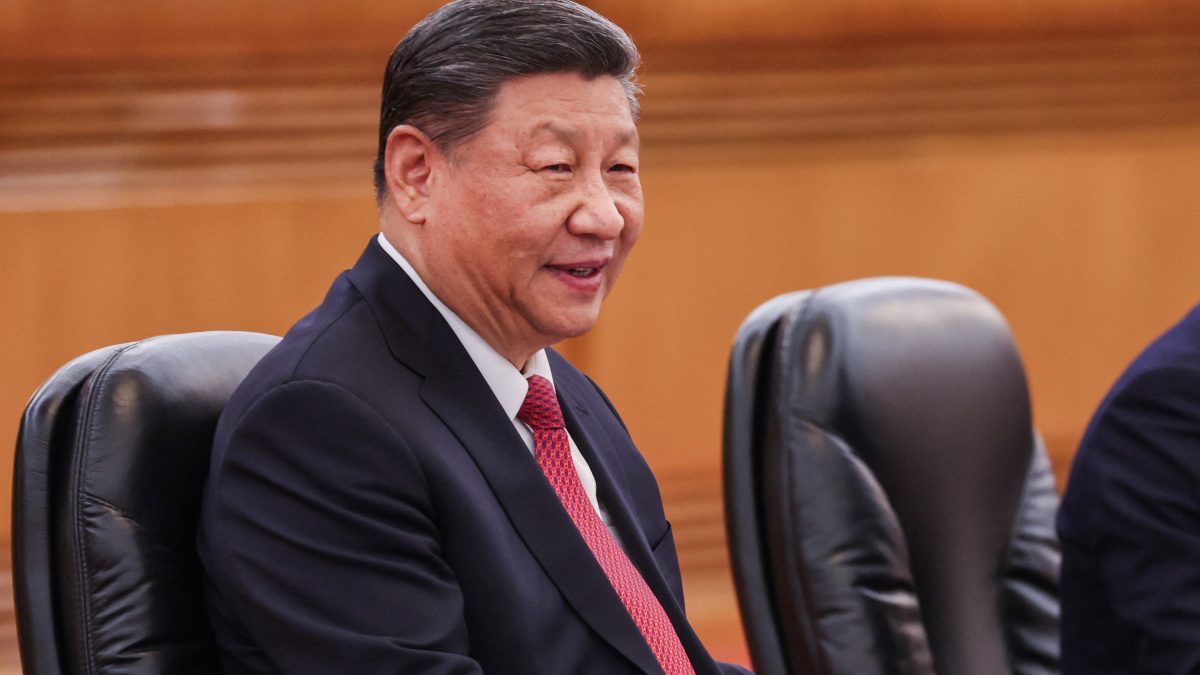President Xi Jinping enters China’s biggest political meeting of the year with his economy regaining some confidence. Rising tariffs imposed by Donald Trump will put Beijing’s capacity to maintain momentum to the test.
Breakthroughs in artificial intelligence and Xi’s recent embrace of private entrepreneurs such as Alibaba’s Jack Ma have fuelled a ferocious market rally ahead of the National People’s Congress. But that optimism is already being dashed, with Trump’s new 10% tariff slated to go into force just one day before Premier Li Qiang puts out China’s economic vision for the coming year.
Thousands of delegates, including ministry chiefs and provincial leaders, will convene in Beijing on Wednesday for the legislative conclave, when authorities will establish a 5% growth target, according to Bloomberg’s survey of analysts.
To get there, authorities are set to increase China’s official budget deficit aim to its highest level in almost three decades, injecting trillions of yuan into an economy grappling with deflation, a housing meltdown, and now a trade war with the United States.
Nearly two months into Trump’s administration, the world’s largest economies are colliding, making it increasingly imperative for the Communist Party to release its people’s spending power. Unlike last year, Beijing’s authorities have committed to prioritise boosting domestic demand above export growth.
China is set to modify its policies “quite a lot” this year, according to Yao Yang, a professor of economics at Peking University, who cautions that the measures may not be strong enough.
Impact Shorts
More Shorts“My first worry is the fiscal stimulus isn’t big enough, particularly when we consider local government debt,” he said.
He added that if China and the US cannot negotiate a settlement, the American government will probably increase tariffs.
“Then we are going to get into a tit-for-tat war. That’s going to be very bad,” he stated.
Maintaining the same growth pace this year while dealing with these issues would necessitate increased fiscal spending, as US tariffs might stymie China’s export engine. Analysts, including Lu Ting of Nomura Holdings Inc., predict that export growth will slow after rising by over 6% in 2024.
That means the government will need to increase its own investment and urge firms and people to spend to make up the difference. The increase in the government deficit will be a crucial indicator of the size of this year’s stimulus.
According to the consensus forecast in a Bloomberg survey of experts, the government will increase this year’s official budget deficit target to about 4% of GDP from 3% in 2024. The enhanced deficit, a broad measure of the fiscal gap, is expected to reach approximately 12 trillion yuan.
That should be adequate to achieve GDP growth of roughly 5%, which most experts believe will need an increase of 3-4 trillion yuan in the wide deficit.
Bloomberg experts predict that the package would include a 2 trillion-yuan limit for new special sovereign bonds, which is double the amount of last year, as well as up to 4 trillion yuan in new special local government bonds. These figures do not include borrowing to repay concealed debt.
As it navigates the uncertainties unleashed by Trump, Beijing is likely to start by favouring a moderate approach, but the fiscal parameters set at the NPC should leave open the prospect of top-ups later in the year. Another factor for the government’s reluctance might be the expense of costly cleanups it has undertaken to reduce local debt problems and reign in asset bubbles.
Another carefully watched metric at this year’s conclave will be the yearly inflation goal, as China enters its longest period of deflation since the Mao Zedong regime. Most economists estimate that percentage to fall below 2%, the lowest it has been in more than two decades.
After analysts in China were instructed to avoid discussing sensitive terms like “deflation, such a decision would indicate that Chinese policymakers are reacting to the realities of low pricing, perhaps leading to further measures to boost demand.
The Chinese leader must strike a difficult balance between providing the necessary stimulation to meet the growth objective and ensuring that help reaches the most vulnerable sectors of the economy.
The success of AI chatbot DeepSeek is one of the recent technological triumphs that may keep policymakers focused on a drive for self-sufficiency and a growth model centred on high-tech industry, with Morgan Stanley anticipating just a third of the stimulus to go towards consumption.
According to Goldman Sachs, as AI use accelerates, China’s potential growth will begin to increase by 2026. The technology will boost yearly growth by up to 0.3 percentage points by 2030, double its prediction prior to DeepSeek’s development, albeit the government will need to carefully monitor the speed of labour replacement.
Household spending has been persistently low as China’s real estate downturn weighs on confidence, and income and job outlook remain grim.
Last year, consumption contributed less than 45% of GDP growth, the lowest since 2006 excluding the pandemic year of 2020, despite an unusual strategy to subsidise a consumer trade-in program with special sovereign bond issuance.
Stopping that drop will be critical as officials attempt to protect the world’s second largest economy from a trade war with its main competitor.
While Trump raises short-term risks for China, “favourable conditions are growing” in the long run according to Xu Qiyuan, deputy head of the Chinese Academy of Social Sciences’ Institute of World Economics and Politics.
“China is facing both challenges and opportunities at this point,” he said. “What matters is not which of them outweighs the other, but how we will deal with them.”
)